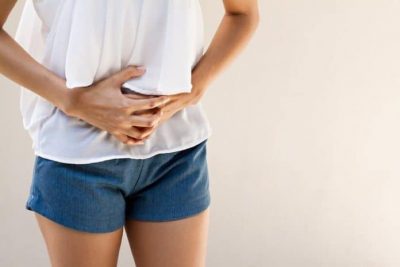
Bloating can be very painful or uncomfortable, impeding the sufferer’s ability to perform their normal activities and enjoy life.
What does the term ‘menopause bloating’ refer to? When we speak about menopause bloating, we’re referring to the very common (and uncomfortable!) symptom of bloating in menopausal women.
While bloating occurs to everyone at some point in their lives, bloating during menopause can be linked to the ongoing hormonal changes women experience during menopause, as changing oestrogen and progesterone levels influence the body’s digestive processes and can lead to bloating.
In this article, we explore why bloating occurs so frequently among women of menopausal age, so you get a better understanding of this uncomfortably familiar symptom.
While the extent and length of bloating episodes will vary from woman to woman, we cover the full extent of menopausal bloating and touch on some bloating treatments to help you deal with this challenging symptom.
What is Bloating and What are the Causes?
Abdominal bloating is a condition where the belly feels full and tight and may appear to be stretched or distended. This sensation is due to one of two casual factors: air retention or water retention.
Oestrogen and Progesterone play vital roles in women’s general health and well-being, and the changes in these hormones that accompany menopause can be the culprit of many of the symptoms women experience.
Studies indicate that both oestrogen and progesterone may influence women’s physiological systems by impacting the regulation of body fluids and sodium content. Higher levels of oestrogen usually mean increased water retention, while lower levels of progesterone can have a diuretic effect.
Because both oestrogen and progesterone fluctuate during menopause, water retention levels will also fluctuate which can lead to an increase in bloating.
The changes in bile production in our bodies can also play a role in bloating. Bile, which is produced in the liver and stored in the gallbladder, plays a crucial role in digestion and the lubrication of the small intestine.
Studies have shown that changes in oestrogen levels influence how our bodies produce bile. If our normal process for bile production is altered, then bloating and constipation can develop. Stools in the large intestine dry up, become hard and accumulate due to lack of lubrication which leads to a very uncomfortable feeling.
While bloating can also be the result of varying lifestyle and dietary factors, bloating in menopausal women has often been linked to the hormonal changes associated with menopause.
Are you experiencing this symptom?
Take the questionnaire to determine if it may be a sign of menopause, and discover how we can help
General Symptoms of Bloating
Symptoms of bloating and the extent of bloating episodes can vary greatly depending on the individual sufferer and their general habits. General symptoms of bloating include;
- Abdominal pain or discomfort
- Distention of the stomach
- Cramping sensations in the abdomen
- Constipation
- Excessive flatulence
- Excessive burping
- Nausea
Menopause Bloating Remedies
There are a range of remedies that can address menopause-associated bloating. Some of these solutions are designed to treat the hormonal causes of bloating and are therefore pharmacological, requiring consultation with a doctor to determine the best choices for you and a prescription for the treatment.
Possible treatments include;
- Hormone therapy
- Dietary supplements and vitamins
However, because bloating can also occur due to a range of dietary and lifestyle factors, other possible menopause bloating cures and remedies are within your control. It’s worthwhile examining these options and giving them a try before resorting to other treatment forms. These other menopause bloating cures include;
- Drinking more water. Being dehydrated can make it more difficult for your body to process food efficiently.
- Get enough fibre in your diet. Ensure your diet includes enough fibre to aid in digestion by including more wholegrains, fruits, vegetables, legumes, nuts and seeds. If you’re eating a low-fibre diet currently, incorporate more fibre slowly so that you don’t shock your body.
- Cut down on processed foods. The high levels of sugar and salt in overly-processed foods can play a role in bloating.
- Exercise regularly. Regular exercise helps regulate our digestion and may help reduce symptoms of bloating when it occurs.
- Reduce alcohol intake. Because drinking alcohol can affect our digestive processes and irritate our gastrointestinal tract, it can lead to bloating.
The Australian Menopause Centre Can Help
If you’re feeling bloated and uncomfortable, don’t wait before reaching out for help. It’s crucial that you talk to a qualified medical practitioner who can guide you in improving your quality of life and support you through the challenges of menopause. Don’t suffer in silence.
If you are experiencing any of the above symptoms, please do not hesitate to contact us on 1300 883 405 to book a free medical phone consultation and discuss your concerns with one of our doctors.
Book A Free No Obligation Medical Consultation
Speak with one of our doctors confidentially to discuss & if you are suitable a treatment plan will be prescribed.